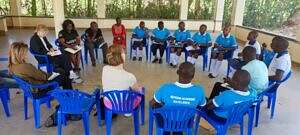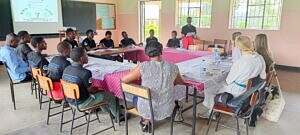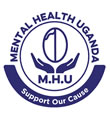Introduction:
The Youth Mental Health Project, a collaborative effort by Mental Health Uganda (MHU) and SOS Children’s Villages Uganda, has made remarkable strides in promoting mental health awareness and providing psychosocial support to young people. With the invaluable support of our donor, Operation Days Work(ODW), and dedicated partners, the project continues to make significant impacts in the districts of Gulu and Wakiso. This blog highlights the recent monitoring visits to these districts, focusing on the project’s progress and future directions.
The Role of ODW and Project Stakeholders:
ODW’s commitment to youth empowerment and mental health has been crucial in driving the success of this project. Alongside SOS Children’s Villages Uganda, MHU has worked diligently to ensure that young people receive the necessary support. Key stakeholders, including school administrators, teachers, and community leaders, have also played vital roles in the project’s implementation.
Focus on Schools:
The project’s primary focus has been on schools, targeting eight specific institutions across Gulu and Wakiso districts. These schools have become hubs for mental health education and support, fostering environments where students can openly discuss mental health issues. The collaboration with schools have been instrumental in integrating mental health awareness into the school curriculum.
Project Monitoring: Gulu and Kakiri:
Recent project monitoring activities in Gulu and Wakiso provided an opportunity to assess the project’s impact on the ground. These visits allowed MHU and SOS Children’s Villages Uganda to engage directly with students, teachers, and the broader community, gaining valuable insights into their experiences and the project’s effectiveness.
In Gulu:

The monitoring visit to Gulu highlighted the success of peer-to-peer mental health models within the schools. Mentors and mental health champions, who have been trained as part of the project, are actively working to create supportive environments for their peers. The collaboration between local partners, including school counselors and community leaders, has been pivotal in driving the project’s success.
During the visit, the team also met with Gulu City local government leaders. This meeting was crucial for discussing the integration of mental health initiatives into local policies and ensuring sustained support for the project. The government leaders expressed their commitment to supporting mental health programs and collaborating with MHU to enhance the well-being of the youth in the region.
In Kakiri, Wakiso:

In Wakiso, the focus was on expanding psychosocial support systems and establishing safe spaces for mental health discussions. The support of ODW has enabled these efforts to reach a broader audience, helping students develop resilience and improve their mental well-being. Mentors and mental health champions in these schools have been key in facilitating these discussions and providing peer support.
Mentors and School Mental Health Champions:
The project has trained a network of mentors and school mental health champions who are pivotal in sustaining mental health awareness and support within their schools. These individuals, selected from among the students and teachers, have undergone comprehensive training to equip them with the skills needed to provide peer support, lead mental health initiatives, and act as liaisons between the students and professional counselors.
Impact of Mentors and School Mental Health Champions:
The impact of these mentors and champions has been profound. They have become trusted figures within their schools, offering a first line of support for students experiencing mental health challenges. By fostering open discussions about mental health, they have helped reduce stigma and encourage more students to seek help. Their efforts have also led to the creation of supportive networks within the schools, where students feel safe to express their concerns and access the help they need.
The Impact So Far:
Feedback from both districts has been overwhelmingly positive. Students have shared their personal stories of how the project has helped them cope with mental health challenges and feel more empowered to advocate for mental wellness within their schools. The roles of mentors and mental health champions have been particularly impactful, providing peer support and fostering a culture of openness and acceptance.
Looking Ahead:
With continued support from ODW and partners, Mental Health Uganda will continue to strengthen its commitment to youth mental health. Future efforts will focus on expanding outreach to more schools and ensuring sustainable community-based mental health services. Training more mentors and mental health champions will remain a priority to support these initiatives.
Toll-Free Counseling Line:
As part of our commitment to supporting mental health, MHU offers a toll-free counseling line, available Monday to Friday from 8:30 am to 5:00 pm. If you or someone you know needs support, please call 0800 21 21 21. Our counselors are here to help.
Conclusion:
The Youth Mental Health Project is demonstrating that with the right support and collaboration, communities can build a future where young people feel empowered to address and manage their mental health. Thank you to our dedicated partners, stakeholders, and donors like ODW for making this possible.

